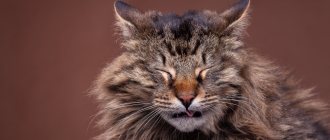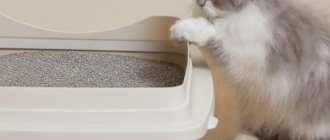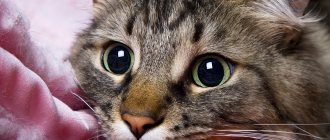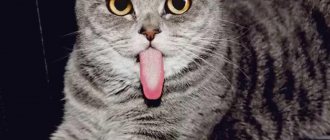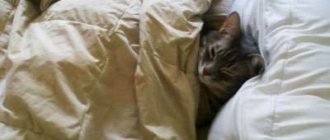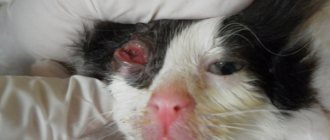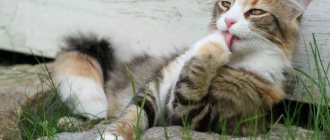My cat is constantly sneezing. What to do?
Have you ever seen a little kitten scrunch up its nose and suddenly let air out through its nostrils with a cute sneeze? It sounds like "Pfft!" and may or may not be accompanied by the discharge of a few drops of fluid or snot.
People almost always sneeze for some reason. If your indoor cat sneezes occasionally and is otherwise active and healthy, you probably have nothing to worry about. However, if your cat's sneezing is not random or is accompanied by blood or mucus, or if your cat has eye discharge or coughing at the same time, the sneezing may be a sign of more serious health problems.
If you are concerned about this symptom in your pet or are simply curious about the issue, this article provides information on some possible reasons why your kitten may be sneezing.
What should an owner do if a cat sneezes?
- Take a close look at your pet to see if there are any additional symptoms, such as cough, shortness of breath, difficulty breathing, runny nose, high temperature and watery eyes.
- Contact your veterinarian for medical help if you notice your pet is clearly unwell.
- Under no circumstances should you attempt to diagnose, much less treat, a cat on your own. Determining serious diseases by external signs is, to say the least, unrealistic. At the clinic, the veterinarian will perform a series of tests and make an accurate diagnosis.
- Seek immediate medical attention if your animal sneezes with blood, or if you find a foreign body in the respiratory tract.
THANK YOU FOR SHARING THIS ARTICLE ON SOCIAL NETWORKS
Cats, like people, are susceptible to colds during the cold season. If your pet is sneezing periodically and has mucus coming out of its eyes, it is likely that it is sick and needs treatment. Of course, sometimes the cause of a kitten or cat’s sneezing can be trivial dust or a speck that gets into the nose, but the symptoms go away within half an hour.
Causes of sneezing in small pets
- Simple, mild tickling or irritation of the nasal mucosa.
This may be the most
obvious cause of sneezing in domestic cats.
A simple irritation in a cat's nose, such as dust or a mild chemical irritant, can cause a reflex sneeze. Remember the animated cat Tom, who sneezes whenever he inhales some pepper. This type of sneezing is not much different from scratching, tickling or itching. In such a situation, there is no need to worry. - Respiratory infections.
Another common cause of sneezing is due to a respiratory infection, most often a viral or bacterial infection. It's true, our pets can catch colds too! Possible infections include: Herpes virus Calicivirus Chlamydial infections Bacterial infections such as mycoplasma Less common are fungal infections that can also cause frontal sinus disease, which often leads to a sore nose. Viral respiratory infections may be accompanied by a cough and, more often, excessive inflammation, redness, or discharge that accumulates in the eyes. In this case, the respiratory disease is complicated by conjunctivitis. - Chemical irritants to the nasal cavity.
Sometimes toxic substances or chemical fumes associated with various solvents can cause inflammation of the linings of the nose and sinuses. Sneezing is the body's way of ridding itself of this irritation. Some cats may also be sensitive to inhaled tobacco smoke, perfumes, and various chemicals. Small pets are also susceptible to secondhand smoke. - Foreign bodies.
Foreign objects in the nasal cavity, such as blades of grass or spiky spikelets, can penetrate the nasal cavity. Firstly, it is an irritation, and if the object is not removed from the nasal cavity during the sneezing process, there is a possibility of infection. - Dental diseases.
Dental disease can also cause sneezing, especially when an infection develops in the area of the roots of the teeth. Dental infections in cats can allow bacteria to colonize the sinuses, resulting in inflammation of the nasal cavity and subsequent sneezing by the animal. - Allergy to pollen.
Allergies to pollen are much less common in cats than in people, but are not uncommon. - Intranasal vaccines.
Vaccines that are designed to fight respiratory infections are given intranasally and often cause sneezing for several days after they are given. The sneezing usually lasts only a few days and goes away on its own without requiring any treatment.
If your cat sneezes only occasionally, treatment is usually not required. However, if your cat has other symptoms, such as nasal or eye discharge, blood or mucus in the nose, decreased activity, or loss of appetite, have your veterinarian examine your cat.
If you have any questions or concerns, you should always visit or call your veterinarian—they are your best resource for ensuring the health and well-being of your pets.
Sneezing with bloody discharge from the sinuses of a cat
If you notice that your pet is sneezing with droplets of blood mucus, immediately contact a veterinary clinic. This symptom is very dangerous and can indicate a serious illness (from a severe fungal infection and extensive damage to the animal’s nasal sinuses due to the prolonged presence of a foreign object in them or a burn of the mucous membrane to leukemia and nasal cancer).
A professional will examine your four-legged pet, prescribe the necessary tests and diagnostic examinations and, based on their results, tell you what your pet’s illness is.
In any of the above cases, if there are several pets in your home, the person suffering from sneezing must be protected from communication with other animals (place him in quarantine so as not to infect others).
So, if your cat is sneezing, what exactly to treat, the veterinarian will tell you. There are many reasons for this condition, and most of them are far from harmless. Don’t let the symptoms and finding out the true disease take their course. This will allow you to react in a timely manner and adequately to the situation.
If you want to minimize the risk of various diseases in your pet, provide him with proper care. Do routine vaccinations of the animal (according to its stage of development), feed it well, and take it to the veterinarian for preventive examinations.
Your care will help your cat be healthy and never sneeze!
My cat sneezes and snorts. What's the matter? General information
Sneezing and snorting seem like obvious enough signs to identify, but it's not always easy to tell them apart in pets. Indeed, these two symptoms can sometimes appear so that many people use the terms interchangeably. Sneezing is usually defined as a sudden, involuntary movement of air from the lungs through the nose and mouth. This phenomenon usually occurs in response to some irritant of the upper respiratory tract, most often to the thin receptor structures of the mucous membrane that lines the nasal passages.
A snort, on the other hand, looks and is identically defined as a sneeze. The difference is that sneezing is involuntary, while snorting is a voluntary effort on the part of the pet.
Dogs and cats sneeze and snort for a variety of reasons related to the functioning of the upper respiratory tract. While many are normal and benign reactions to simple irritation, some may signal infections, upper airway obstructions, and allergic diseases. There are also other pathological conditions of the upper respiratory tract.
How to prevent cat sneezing
We bear great responsibility for the animals we have tamed, and therefore all conditions for their living must be created in our home. You should also exclude all possible factors that could provoke sneezing or diseases accompanied by this symptom in cats.
Constantly wipe the dust on the floor and furniture, and periodically run a vacuum cleaner over soft upholstery. Remember to wash and clean your pet's pad, and change the litter in his litter box regularly (and don't forget to wash the litter box).
We suggest you read: Stomach diseases in cats - Sick Cat
When the room becomes very dry (especially in winter), turn on a special humidifier or place vessels with water near the radiators, which will evaporate and humidify the air.
Also, the cat should always have a bowl filled with clean water so that he can independently maintain the water balance in his body.
If possible, use hypoallergenic litter trays. Also try to choose your cat food carefully - if you can’t find a hypoallergenic one, buy different options until you find one that doesn’t make your cat sneeze.
If you notice problems in the cat's mouth, contact your veterinarian immediately. The longer you leave the disease unattended, the more serious health problems your cat may develop.
Timely vaccination will protect the animal from viral diseases, which not only can cause the death of the animal, but can also be transmitted to you.
It is important to promptly vaccinate cats against upper respiratory tract infection (cat flu), against feline panleukopenia (“feline distemper”) and against feline leukemia. If an animal periodically finds itself on the street and may come into contact with yard animals, be sure to vaccinate it against rabies.
When a cat or kitten sneezes, and does it very often and for a long time, do not ignore this fact. Even if you can't immediately visit a veterinarian to find out how to treat your cat, at least examine him for oral problems and symptoms of other diseases.
As we found out, sneezing is only a symptom of some illness. To prevent a cat from suffering from constant “Apchhi”, you need to:
- If your pet is sneezing due to an allergy, it is important to determine what is causing the pathological reaction. Once the allergen is identified, it will be necessary to eliminate or minimize its presence in the room where the pet lives;
- To avoid colds, you do not need to let your cat outside for a long time in cold, rainy and windy weather. The animal's sleeping place should be equipped in a dry, moderately warm place without drafts. If the apartment is cold, you can put a warm blouse on your pet or cover it with a blanket;
- Infection cannot always be avoided, but it is better to exclude the cat from communicating with stray animals. For some ailments (including rhinotracheitis), cats are given vaccinations that help develop immunity to infectious agents;
- The apartment where an asthmatic cat lives must be crystal clean and regularly ventilated. Tobacco smoke should be avoided;
- Worms poison not only the respiratory system, but also the intestines, stomach, heart and other important organs. Cats are dewormed once a quarter, even if there are no signs of worms at all;
- In order not to miss a serious disease at the initial stage, it is important to show your cat to a veterinarian at least once a year. And if you notice any alarming symptoms, you need to run to the clinic immediately.
There is a popular saying: if a cat sneezes on Tuesday or Thursday, you should wish him health and thank him. For what? Because this is a sign that a pleasant meeting with old acquaintances awaits you. If a cat sneezes on Wednesday or Friday, do not forget to wish her health and thank her - this also means a happy reunion of friends. A kitten sneezes and can’t stop on Saturday, but he’s still old enough to fit into a hat? - Expect good guests!
These are all folk signs that do not depend in any way on the breed and health of the cat. Why do cats sneeze?
Sneezing:
- Infectious diseases.
Both cats and dogs can suffer from infectious diseases that manifest themselves, at least in part, as sneezing. In fact, almost any infectious disease that affects the upper respiratory system can cause sneezing in an animal. In dogs, everything from kennel cough syndrome to distemper virus to nasal cancer can cause sneezing. In cats, viral upper respiratory tract infections (eg, feline herpesvirus) are the most common causes. - Obstruction of the upper respiratory tract.
Everything from malignant tumors to benign polyps, from foreign bodies to tissue growths in the upper respiratory tract (most often the result of brachycephalic syndrome seen in these breeds) can cause irritation of the nasal passages and therefore sneezing. - Allergies (or other immune system diseases).
Although allergic rhinitis is not as common in pets as it is in humans, it is still quite common. Dogs and cats are susceptible to allergies that affect the nasal passages, as well as nasal inflammation for a number of other processes related to the immune system. - Inhaled irritants.
Dust, perfume, carpet powders, pollen and other common inhaled irritants can cause sneezing in dogs and cats.
Causes of sneezing
In cats, sneezing occurs due to various factors. The nature and mechanism of this phenomenon is no different in humans and animals. Most often, a cat sneezes due to irritation from mucous dust and allergies. This does not happen often and is normal.
© shutterstock
But if the cat sneezes constantly, then you need to pay attention to this and try to eliminate the irritant. If this does not help, then you need to find out the reason.
Causes of frequent sneezing in cats:
- viral and bacterial diseases;
- mycoses;
- foreign bodies entering the nose;
- cold;
- cigarette smoke;
- exposure to household chemicals;
- allergy;
- polyps in the nasal cavity;
- inflammatory processes;
- traumatic effect on the nose;
- contact with perfumes and other aerosols;
- parasites in different organs;
- pollen and dust;
- features of the anatomy of the nose;
- mites;
- diseases of the gums and teeth;
- malignant tumors in the nose;
- inhalation of mold fungi.
These are the main reasons why a cat may start sneezing. A veterinarian can determine the presence of these or other factors that cause a cat to sneeze frequently. Contacting a specialist is necessary, since it is easier to solve the problem at the beginning of its development.
It is also necessary to take into account what breed the animal belongs to. Many artificially bred cats have reduced immunity and altered facial anatomy . This can often be an explanation why a cat sneezes regularly, but does not have diseases or pathologies.
Inhalation of foreign bodies or aspiration:
- Obstruction of the upper respiratory tract.
Like people who snore heavily and have sleep apnea, many dogs and cats who have mechanical obstructions in the upper airways (usually inherited as part of what is called "brachycephalic syndrome") snort more often than other pets in an obvious attempt to clear the airways of foreign bodies or fluid. Indeed, any condition that causes enough irritation in a pet to require clearing of the nasal passages can lead to snorting. - Obesity and excess weight.
Cats that are overweight due to adipose tissue tend to exhibit symptoms similar to those seen in animals with upper airway obstruction or respiratory tract irritation from other causes. They will also snort more often than other pets.
.
Why does my pet sneeze?
The sneezing process can be caused by various reasons. If your cat sneezed violently just a few times in a row, then most likely dust particles got into her nose. Frequent sneezing occurs due to:
- allergies;
- foreign body in the respiratory tract;
- diseases of the respiratory system;
- worms;
- problems with teeth.
Allergies in cats
Cats, like people, experience allergic reactions. Animals begin to sneeze and rub their noses with their paws. Often, allergies develop to chemical detergents and cleaning products that owners use when cleaning their homes. Allergens also include plant pollen and cigarette smoke. Some cats start sneezing because of cat litter. Their eyes water.
Finding out the cause of an allergic reaction is quite difficult. If your pet starts sneezing, then look at what objects it comes into contact with, remember what chemicals you used when you had to do the cleaning. For example, you washed the cat's food bowl using some kind of detergent, or sprayed air freshener in the presence of the animal.
When eating food in a hurry, pieces of food, water, and during play - small objects (buttons, small parts from toys, pins) get into the respiratory tract. Fluids leave the respiratory system due to a reflex contraction of the muscles of the larynx.
With solid objects the situation is different. They linger inside, constantly causing a sneezing reflex and coughing. If a foreign body enters your cat's respiratory tract, contact your veterinarian immediately for help. In such cases, you cannot hesitate, because it is difficult for the animal to breathe. It may die.
Sneezing is a sign that the cat has a cold or has some kind of respiratory illness. For example, a cat fell ill with rhinitis. With this disease, the nasal mucosa becomes inflamed due to parasites or mechanical damage. In addition to sneezing, the following symptoms are observed:
- eyes water;
- a runny nose appears (snot of a serous, mucous, mucopurulent nature);
- crusts appear around the animal’s nostrils;
- wheezing is heard when breathing;
- inhalations and exhalations are made through the mouth;
- the animal does not eat well;
- The pet has a hot nose.
Treatment of rhinitis consists of eliminating the cause of the disease. Veterinarians recommend cleaning the nasal passages of cats, rinsing them with astringent solutions, and inhaling sulfonamides and antibiotics.
The reason why a cat sneezes several times in a row may be due to bronchial asthma. When the disease occurs, attacks of suffocation are observed. A sick animal, as a rule, sits with its neck stretched out, sniffles, wheezes, coughs, and tries to breathe through its mouth. If your pet has difficulty breathing, you should immediately take it to a veterinary clinic. After diagnosis, the doctor will advise treating the disease at home with drugs that dilate the bronchi.
Helminths
Do cats sneeze from worms? This is a pressing question for pet owners. Helminths sometimes cause sneezing. Some types of parasites, when they enter the intestines, do not remain there, but penetrate through the mucous membrane into the blood vessels, then enter the lungs through the bloodstream. Being in the bronchi, helminths cause irritation. When sneezing and coughing, they enter the oral cavity and are swallowed again by the animal.
Heartworms are very dangerous. Veterinarians, identifying them, immediately prescribe treatment. Worms enter the body after a mosquito bite. Helminth larvae travel through the bloodstream to the heart, where they remain. The growth and development of worms occurs in the organ.
Adults cause blockage of arteries. The pet begins to breathe heavily, sneeze and cough. As a result, infection with heartworms leads to a sad outcome - the cat has a heart attack and dies. That is why it is necessary to treat helminthic infestations.
Dental problems
Another reason for sneezing is bad teeth. Infectious and inflammatory processes occurring in the oral cavity often spread to the nasal area. In this regard, the domestic cat begins to sneeze and rub its nose with its paw for no apparent reason, and snot appears. Due to her illness, she doesn't eat well.
To save your pet from dental problems, take him to the veterinarian. Appropriate treatment (such as tooth or tartar removal) may be required. To prevent oral diseases in your pet, use a special toothpaste for animals or purchase food, some of which have now begun to help partially remove plaque.
We suggest you familiarize yourself with: Laxative for cats at home - lactusan for cats dosage
Reverse sneezing:
While sneezing and snorting are expulsions of air from the nose/mouth, "reverse" sneezing is an involuntary, spasmodic inhalation that some dogs exhibit. Episodes of such abnormal breathing can last several minutes. It's not uncommon for a dog to do this after being walked and breathing something (dust, pollen, dirt) into its nose.
Many dog owners see reverse sneezing and initially assume their dog is choking or in crisis. While this is alarming to the uninitiated owner, there is nothing more to this condition than irritation of the tissues in the back of the throat and soft palate. This sign is completely benign. It can also occur with tracheal collapse.
What can cause a pet to sneeze?
When choosing a child's first pet, many parents are horrified at the prospect of having a dog or cat that will eventually be cared for by adults. A hamster or other rodent, in this regard, is the best option.
A child over 7 years old will be able to take care of a pet independently, and this instills a sense of responsibility. Naturally, you need to sensibly assess the child’s readiness to care for a miniature rodent. If the baby tends to quickly switch from one priority to another, to carelessly handle animals, or is too active, it is better for him to look for a “stronger” pet or postpone this idea for the future.
What should I do at home if my pet sneezes?
All pets that are experiencing sneezing and snorting with increasing frequency should visit a veterinarian. Here are a couple of simple, common sense tips for pet owners whose animals sneeze or snort constantly.
- Limit your pet's movement.
Place your pet in a crate or small area (such as a bedroom or bathroom) to observe his behavior. - Don't overload your pet.
Long walks or exercise should be avoided until you can take your pet to the vet. - Take your pet's temperature.
If your pet has a high fever (over 40-41 degrees), contact your veterinarian as soon as possible.
If your pet is suffering from other obvious symptoms, such as difficulty breathing, pain, poor appetite, or is simply acting differently than usual, take him to the vet immediately - if necessary, to a hospital with a intensive care unit. Additionally, if there is nasal discharge or the sneezing is productive, meaning mucus, blood, or other discharge is produced, your pet should see a doctor. These are usually signs of a more urgent health condition than the advice given here.
If you don't know what to do, call your veterinarian or animal emergency clinic.
A cat sneezes blood - how dangerous is it and what to do?
Blood indicates damage to the mucosa. They can be caused by a foreign body, progressive infection by bacteria or a virus. The nasal passage should be inspected; visible accessible particles (lint, wool) are removed without using tweezers. If lumps are detected, you should consult a doctor. They may indicate neoplasms.
Infections should be treated by a doctor. The breeder can only treat the nose with water or a wet soft cloth. You cannot wash the cavity yourself. If bleeding caused by scratching is detected, the pet is urgently taken to the veterinary clinic or a doctor is called to the house.
Be sure to read:
Dry nose in a cat: reasons, what should be normal, good or bad, what to do
What can your veterinarian do?
When you take your pet to the vet, here's what the doctor may do:
- Analyze the history of the disease.
Most veterinarians will start asking a few questions to understand the history of the problem. When did you first notice sneezing or snorting? What has changed in your general condition? How did your pet feel before? - Conducting a clinical examination.
Because there are many possibilities for these symptoms to occur, whole-body examination is a necessary part of the diagnostic process. - Conducting laboratory diagnostics.
In these cases, a blood test is usually performed. In addition to basic TCA and biochemistry, specific tests may help identify certain infectious or allergic diseases. - Taking x-rays and other photographs.
If brachycephalic syndrome, tumor, or upper airway obstruction/foreign bodies are suspected, an x-ray will often be performed. Sedation or anesthesia may be required to obtain good X-ray images. Sometimes additional imaging techniques are required: ultrasound, CT and/or MRI. - Conducting a visual examination under sedation or anesthesia - rhinoscopy.
Pet anesthesia is usually a necessary procedure to thoroughly evaluate pets that sneeze or snort. It may be necessary to use a rigid or flexible scope to visualize the tissues of the nose and upper respiratory tract. Once there, your veterinarian may even take tissue samples (biopsy) for microscopic diagnosis (histology).
Why is my cat sneezing?
Have you ever observed your cat sneezing? Don't worry, an occasional sneeze is no big deal! When a cat sneezes, it simply releases high-pressure air from its nose and mouth.
However, if your cat is sneezing excessively and has snot
(more than several times a day or more than several days in a row), a visit to the veterinarian's office may be required. This is especially important if you notice additional clinical signs other than sneezing, such as:
- Runny nose, sour eyes, snot
- Squinting of the eyes (which may be associated with corneal ulcers)
- Nasal discharge (usually clear, but may turn yellow)
- Lethargy
- Difficulty or pain in chewing food (due to ulcers on the tongue or mouth)
- Drooling (due to ulcers on the tongue or mouth)
- Bloody nasal discharge or nosebleeds
- Lack of appetite/anorexia
- Decreased appetite or hyporexia
- Red eyes (eg, red eyes due to secondary inflammation of the conjunctiva)
- Mouth ulcers
- Noisy breathing
- Increased or difficulty breathing
- Dehydration or sudden weight loss
- Fever
- Weight loss
- Swelling around the nose or deformed nose
What symptoms may accompany sneezing?
Along with sneezing, animals sometimes exhibit other symptoms. Why is My Cat Sneezing? . Among them:
- apathy, lethargy, depression;
- discharge from the eyes, ulcers and swelling;
- difficulty or rapid breathing;
- fever;
- nasal discharge, including clear, yellow or bloody discharge;
- poor condition of the fur, its loss;
- increased salivation;
- decreased appetite, refusal to eat and weight loss;
- wheezing and coughing.
If sneezing is accompanied by any of these signs, be sure to contact your veterinarian for advice.
Justin A. Lee, veterinarian with over 18 years of experience
Do not delay your visit; any delay may be dangerous for your pet.
What can cause sneezing?
Typically, sneezing can be associated with:
- Allergens such as dust, pollen and pet dander
- Foreign objects such as grass, small pieces of plant seeds, etc.
- Viral upper respiratory tract infections (eg, calicivirus, herpesvirus)
- Inflammation of the upper respiratory tract (eg, rhinitis)
- Infection in the lungs (eg, pneumonia, bronchopneumonia), Secondary upper respiratory tract infections
- Infectious causes (eg, upper respiratory tract infections, fungal infections, etc.).
- Cancer (often squamous cell carcinoma of the nasal cavity)
- Polyps are relatively benign neoplasms of the nasal cavity.
Finding out the cause of cat sneezing
In 99% of cases, continuous sneezing for a long time is associated with the manifestation of some disease. The only exception is when a foreign object gets into the kitten’s nose. Typically, sneezing is accompanied by rubbing the nose with a paw, snorting and shaking the head.
In this case, it is worth checking your pet’s nose for the presence of debris or lint from the carpet and try to remove the detected contents. Since the kitten's nose is still very small, try to act as carefully as possible.
Cat cold
The kitten’s immunity is not yet sufficiently developed, so a common cold is the first disease in the ranking of ailments that cause sneezing. Most often it occurs in the cold season. Additional symptoms may include:
- discharge from the nose and eyes;
- lack of appetite;
- lethargy, loss of playfulness.
In general, everything is almost like with people
. Remember the last time you had a cold and compare it with the cat’s condition. It would not be amiss to analyze the reasons why he could get sick. This will help eliminate similar problems in the future.
How bad can the causes of sneezing be? Main reasons why my cat sneezes?
What is the prognosis for this symptom in small pets?
If your cat's symptoms include sneezing, squinting, drooling, snot, and you just brought home a new kitten, especially from an animal shelter, the cause is usually an upper respiratory tract infection (commonly called an "URI") caused by a calicivirus or herpesvirus. . Fortunately, the prognosis is satisfactory for animals with acute respiratory infections. Because these viruses are highly contagious to other cats (but not to people, so don't worry!), you should ensure that symptomatic cats are isolated and ensure that your cats are up to date on vaccinations (quality vaccines should be used). These biologically active drugs should help protect against some strains of these viruses). Keep in mind that just as the herpes virus can hide in the human body for a long time (for example, herpes A), viruses can also hide in the body for a long time in cats without any symptoms and recur (resurface again after several years) under stress . Throughout life, occasional sneezing can be observed after a stressful event (eg, traveling in a car or train, boarding a plane, etc.).
There are other infections that can suppress a cat's immune system, such as feline leukemia (FeLV) or feline immunodeficiency disease (FIV), which can also predispose a cat to viral or bacterial infections, which can lead to sneezing.
Less commonly, other types of bacteria or fungal infections (such as Bordetella, Mycoplasma, Chlaymdia, etc.) can also cause a cat to become sick and sneeze.
Rarely, sneezing can be caused by cancer—most often an aggressive type called squamous cell carcinoma. Unfortunately, the prognosis for cancer of the nasal cavity or upper respiratory tract is very poor, even with surgery and chemotherapy for cancer treatment.
If in doubt, consult your veterinarian. The veterinarian's office may use fluid infusions (under the skin or intravenously, depending on how sick your cat is) to help her body fight the disease. A sick animal should be offered more tasty and nutritious food. In addition, moderate to severe cases of acute respiratory infections may require certain medications. If clinical signs still persist, a thorough examination of the mouth and nose under sedation and an X-ray or CT scan of the nose and head may be required.
Reasons why a cat sneezes
Dust in the nose
In this case, the sneezing goes away as soon as pieces of debris fly out of the cat's nostrils. It is worth checking your pet’s mouth and nose for debris or lint from the carpet.
Allergy to strong odors
Small kittens are most susceptible to it, but adult cats often suffer from allergies to chemicals, cigarette smoke, pollen or perfume odors. Sometimes a cat sneezes because of new food or cat litter. Sneezing usually goes away once the allergen is eliminated.
Viral or fungal infection of the respiratory tract
Infection occurs during walks, communication with other cats, from kitten to kitten during play. There is an increase in temperature, lethargy, watery eyes, the sick cat sneezes and coughs. The causes of infection are viruses, fungi, and bacteria in the air.
Toxoplasmosis
Chlamydia
If a cat has picked up this infection somewhere, it can infect a person through contact with the animal. It is necessary to begin treatment with a veterinarian and do tests before doing this.
Bortedellosis
It is possible for an adult cat or kitten to become infected. The pet begins to sneeze, cough, there is difficulty breathing, and watery eyes.
Mycoplasmosis
Accompanied by inflammation of the eyes, the appearance of pus, and sneezing.
In all these cases, you need to know what to do if your pet sneezes and coughs. It is advisable to have the phone numbers of a veterinary clinic at home so you can seek advice from specialists.
The cat is sneezing, how to treat it?
Treatment tactics for animal diseases that manifest as sneezing and coughing
can vary greatly depending on the cause. It is important to make the correct diagnosis. Self-medication can harm your pet's health.
List of medications and therapeutic procedures:
- Rinse the nasal cavity with sterile saline solution
- Use of intranasal drops (antiallergic, anti-inflammatory, immunomodulatory, antiseptic, antiviral, decongestant, vasoconstrictor)
- Use of cold and hemostatic drugs for nosebleeds
- Surgical methods of therapy and chemotherapy for oncological processes
- Systemic antibiotics and treatment of the underlying disease
- Identification of complications and their timely correction
More details about the reasons
When it comes to dental problems, the most common reason why a cat sneezes is a tooth abscess.
Severe sneezing occurs with this diagnosis if it is complicated by an infection, which causes irritation of the animal’s nasal cavity.
The most dangerous cause of sneezing is nasal cancer. The main symptom is severe, constant sneezing with blood. If such a disease is detected, do not despair; it is treated using chemotherapy.
Very often it is not adult animals that start sneezing, but kittens. This is because babies are more susceptible to various types of infections, especially if they have not yet been vaccinated.
If the cause of sneezing is polyps, then this problem can only be solved surgically.
